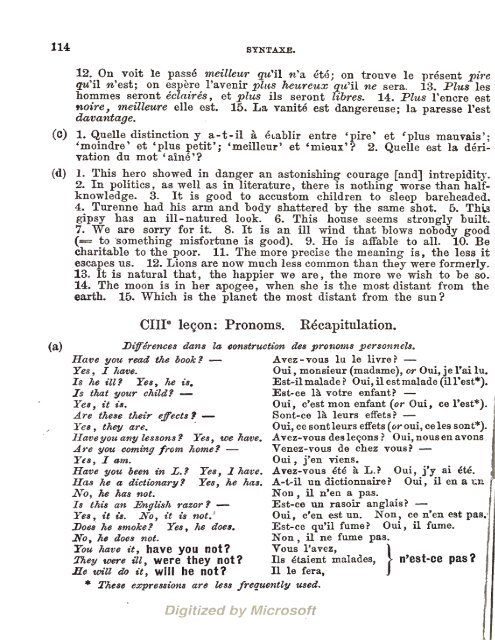comparative french-english studies, ninth edition - World eBook ...
comparative french-english studies, ninth edition - World eBook ...
comparative french-english studies, ninth edition - World eBook ...
Create successful ePaper yourself
Turn your PDF publications into a flip-book with our unique Google optimized e-Paper software.
114 SYNTAXE.<br />
12. On voit le passe" meilieur qu'il w'a etc; on trouve le present pire<br />
qu'il n'est; on espere 1'avenir plus heureux qu'ti ne sera. 13. Plus les<br />
hommes seront edaires, et plus ils seront libres. 14. Plus 1'encre est<br />
noire, meilleure elle est. 15. La vanite est dangereuse; la paresse Test<br />
davantage.<br />
et 'plus raauvais';<br />
moindre' et 'plus petit'; 'meilleur' et 'mieux'? 2. Quelle est la derivation<br />
du mot 'aine'?<br />
(C) 1. Quelle distinction y a-t-il a eiablir entre 'pire 1<br />
(d) 1. This hero showed in danger an astonishing courage [and] intrepidity.<br />
2. In politics, as well as in literature, there is nothing worse than halfknowledge.<br />
3. It is good to accustom children to sleep bareheaded.<br />
4. Turenne had his arm and body shattered by the same shot. 5. This<br />
gipsy has an ill-natured look. 6. This house seems strongly built.<br />
7. We are sorry for it. 8. It is an ill wind that blows nobody good<br />
(= to something misfortune is good). 9. He is affable to all. 10. Be<br />
charitable to the poor. 11. The more precise the meaning is, the less it<br />
escapes us. 12. Lions are now much less common than they were formerly.<br />
13. It is natural that, the happier we are, the more we wish to be so.<br />
14. The moon is in her apogee, when she is the most distant from the<br />
earth. 15. Which is the planet the most distant from the sun?<br />
CIIP legon: Pronoms. Kecapitulation.<br />
(a) Differences dans la construction des pronoms personnels.<br />
Have you read the<br />
Yes / , have.<br />
book? Avez-vous lu le livre?<br />
Oui monsieur , (madame), or Oui, je<br />
1'ai lu.<br />
Is he ill? Yes, he is. Est-il malade ? Oui, il est malade(il Test*).<br />
Is that your child? Est-ce la votre enfant?<br />
Yes, it is. Oui, c'est mon enfant (or Oui, ce Test*).<br />
Are these their effects f Sont-ce la leurs effets?<br />
Yes , they are. Oui, ce sont leurs effets (or oui, ce les sont*).<br />
Have you any lessons? Yes, we have. Avez-vous des lecons? Oui,nousenavons<br />
Are you coming from home? Venez-vous de chez vous?<br />
Yes, I am. Oui, j'en viens.<br />
Have you been in L.? Yes, 1 have. Avez-vous e"t6 a L.? Oui, j'y<br />
ai e"te".<br />
il en a UR<br />
Has he a dictionary? Yes, he has. A-t-il un dictionnaire? Oui,<br />
No, he has not. Non , il n'en a pas.<br />
Is this an English razor? Est-ce un rasoir anglais?<br />
Yes, it is. No, it is not. Oui, e'en est un. Non, ce n'en est pas.<br />
Does he smoke? Yes, he does. Est-ce qu'il fume? Oui, il fume.<br />
No, he does not. Non il ne fume , pas.<br />
You have it, have YOU not? Vous 1'avez, \<br />
They were HI,<br />
He will do it,<br />
were they not?<br />
will he not?<br />
Ils e"taient<br />
II le fera,<br />
malades,<br />
J<br />
*<br />
These expressions are less frequently used.<br />
J-<br />
n'est-CB pas? I
















